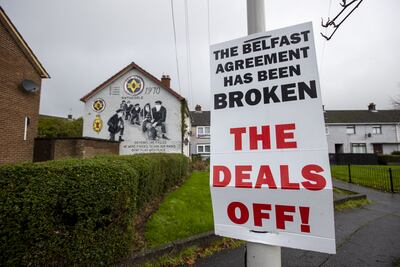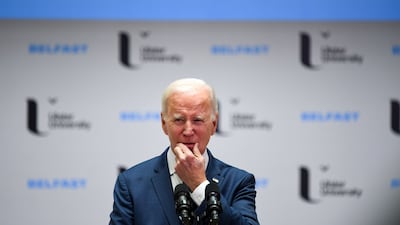It may have been a fleeting visit to a rainy and chilly Belfast yesterday, but Joe Biden’s presence and reaffirmation of America’s commitment to Northern Ireland’s Good Friday Agreement was another milestone on the long road from war to peace.
Speaking at one of the city’s universities, Mr Biden said that by 1998 the "Troubles" had become the longest running conflict in Europe since the Second World War. Every one of its more than 3,500 deaths had “left an empty chair at the dining room table“, the US leader added. "Peace was not inevitable - we can never forget that.”
The thorny nature of the path to peace, however, was laid bare by another development. Around the time Mr Biden was preparing to arrive on Tuesday night, news emerged that a man suspected of having been the British military’s most senior agent inside the Irish Republican Army’s internal security unit – a squad linked to dozens of killings – had died, taking his secrets to his grave.
Such is the bitter legacy of decades of political and sectarian violence. Even sophisticated political compromises – and 1998’s Belfast/Good Friday Agreement certainly was that – can leave many painful questions unanswered and bereaved families still doggedly seeking justice.
Nevertheless, the Agreement – a complex, imaginative international treaty between Ireland and the UK, endorsed by almost all the local political parties and by public votes in both jurisdictions in Ireland – remains a credible example of how negotiation, dialogue and compromise can chart a course out of seemingly unending conflict.

The personal price for many in endorsing the Agreement was high. People had to watch paramilitaries who had killed their loved ones be released from prison early on licence. Many took a breath and decided to compromise on fiercely held aspirations for a united Ireland or accept that Northern Ireland might vote one day to leave the UK. However, the constitutional ambiguity baked into the deal allowed Northern Ireland’s parties to sell it to their respective supporters as a win.
But bringing the protagonists to the point of a deal was not easy. And although the US is more often known for its military power, it was Washington’s political and diplomatic influence that proved critical in moving the peace process along and getting a deal over the line. Many recall the composure and patience of George Mitchell, a US senator with Lebanese roots, who chaired the multi-party negotiations that eventually produced the Agreement.
There was a sense 25 years ago that if a deal could be reached, then the endorsement of a global superpower would make it stick. The high-profile visit of Bill and Hillary Clinton to Ireland in 1995 to encourage the peace process was just the visible manifestation of the preceding years’ tricky, behind-the-scenes manoeuvring to get all the warring factions on board the political train.
But no deal is ever perfect. Northern Ireland’s political institutions, designed in such a way that neither of its two main communities could dominate the other, have repeatedly collapsed amid scandal and acrimony. Northern Ireland remains largely segregated – unionists and nationalists mainly live in their own areas and send their children to separate schools. There is little agreement about the past or on the nature of the 30-year “Troubles”. In addition, a plethora of investigations into past killings – be they by paramilitary groups or Britain’s security forces – reminds people of the shadowy intelligence war that played out during the conflict.
Context is everything, however, and a brief look at the years leading up to the 1998 deal reveals a catalogue of horrors that few in Northern Ireland under the age of 35 have much experience of – such as the nine civilians killed in the IRA’s bombing of a Belfast fish shop in 1993 followed a week later by eight people being gunned down by pro-British paramilitaries in the Rising Sun Bar in the village of Greysteel.
That such atrocities no longer take place make it unarguable that Northern Ireland is in a much better state. Yes, it may have been disappointing for Mr Biden personally that there was no functioning Northern Ireland Assembly for him to address – it being another victim of the region’s political divisions exacerbated by Brexit. But the fact that the Agreement and its institutions, flawed as they are, remain the only political show in town reveals the bedrock of support for the compromise reached in 1998.
Where Northern Ireland goes from here is uncertain and no-one should be complacent. But that a generation has grown up largely free of the violence that ruined so many lives in the years before is an achievement that everyone involved should be proud of. It is also one that those elsewhere seeking a way out of their own conflicts may draw inspiration from.


